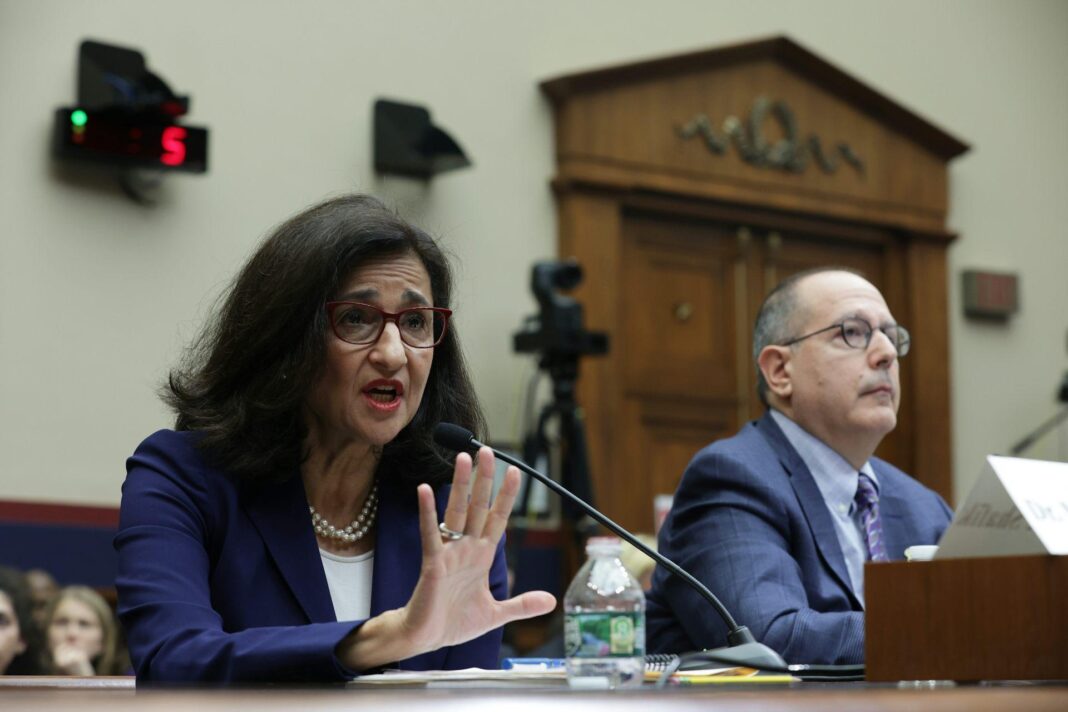Lawmakers grilled Columbia University President Minouche Shafik and three colleagues on April 17, 2024, over antisemitism on college campuses, just four months after three of her presidential peers were summoned to Capitol Hill over how their institutions were handling antisemitism on campus following Hamas’ attack on Israel on Oct. 7, 2023. Two of them resigned shortly thereafter. Here, Lynn Greenky, a scholar of communication and rhetoric, gives her take on how Shafik handled being in the same hot seat as her colleagues.
Unlike Claudine Gay, Liz Magill and Sally Kornbluth – the presidents of Harvard, the University of Pennsylvania and MIT, respectively – Shafik and the other witnesses representing Columbia University spoke with greater moral clarity on the issue of what constitutes antisemitism on campus. Of course, they had the benefit of being able to first see what happens when you don’t.
Columbia’s president, Minouche Shafik, as well as David Schizer and David Greenwald, co-chairs of the Columbia University Task Force on Antisemitism, and Co-Chair of the Board of Trustees Claire Shipman, came ready to acknowledge their responsibility, even culpability, in their failure to recognize and control hate speech directed at Jews on campus. Shipman in particular made it clear that Columbia is suffering a “moral crisis” on its campus.
All of the witnesses showed a lot of deference to the committee. They even thanked the committee for the investigation and asked for the committee’s help to address antisemitism on campus. In fact, Shipman concluded her opening statement saying she looked forward to the committee’s input as Columbia seeks to refocus its vision back to its core values of wisdom, empathy and respect.
Professors Joseph Massad, Katherine Franke and Mohamed Abdu were mentioned by name.
Several members of the Congressional committee singled out Massad, who on Oct. 8, 2023, described the Hamas attack on Israel as “awesome” and “innovative” in an online article, for particular scorn. Shafik promised the committee that Massad would be removed from his position as chair of Columbia’s academic review committee, whose principle function is to “assess program quality and effectiveness,” “foster planning and improvement” and “provide guidance for administrative decisions.” Shafik also indicated Massad might be fired even though his position is tenured.
While some might argue that removing Massad as chair, or firing him, infringes on the professor’s First Amendment right to academic freedom, it is unclear whether that assertion will save him. The Supreme Court has not provided specific guidance on the parameters of academic freedom. In fact, the concept of academic freedom generally refers to a scholar’s freedom to pursue inquiry, discussion and teaching within the sphere of that scholar’s research and consistent with the institution’s curriculum. Academic freedom is not the same as a professor’s individual right to speak one’s mind.
The committee’s chairperson, Virginia Foxx, a Republican from West Virginia, warned that radical faculty remain a huge problem at Columbia. She said she expects Columbia to make “tangible progress” to sanction or remove radical faculty. If not, she says, Columbia will be brought before the committee again.
Recalling a House resolution that condemned the chant “from the river to the sea” as antisemitic, Rep. Elise Stefanik, a Republican from New York, pushed Shafik to amend her previous testimony that alluded to how the chant can, in some circumstances, represent protected political speech.
Shafik seemed reluctant to label students or faculty as engaging in hate and harassment. She tried very hard, sometimes unsuccessfully, to assert the need to balance constitutionally protected speech with the educational mission of the university.
Still, Shafik frequently testified that the policies and structures in place at Columbia prior to the Oct. 7 attack were inadequate. In her written statement to the committee, Shafik admitted that before Oct. 7, Columbia’s process for reporting allegations of hate speech, harassment and other forms of disruptive behavior needed to be simplified. She also said staff training needed to be improved. Throughout her testimony she acknowledged her personal horror at the hatred and vitriol expressed on campus both before and after Oct. 7.
Shafik, Schizer and Shipman each repeated the refrain that they recognize the mistakes and failures made in response to events on campus that – according to their testimony – left Jewish students angry and frightened. They said they are working on revising policies and practices that will promote vigorous debate while protecting student safety.
As a result of some of the preliminary recommendations of Columbia’s Task Force on Antisemitism, the university has updated the reporting and response process regarding harassment and discrimination.
Rep. Foxx made it clear that continued eruptions on campus, which the House has identified as antisemitic, risk the withdrawal of federal funds.
Certainly, a college or university has a compelling interest in protecting its students, faculty and staff’s freedom, safety and integrity. However, as always, the devil is in the details. It is difficult to mediate the appropriate balance between promoting robust debate and protecting against offense. Often, when colleges and universities undertake the task, I believe it is the freedom to speak one’s mind that suffers.
This article is republished from The Conversation, a nonprofit, independent news organization bringing you facts and trustworthy analysis to help you make sense of our complex world. It was written by: Lynn Greenky, Syracuse University
Read more: Graduation rates for low-income students lag while their student loan debt soars AI chatbots refuse to produce ‘controversial’ output − why that’s a free speech problem Venezuela: why Maduro is ramping up his attack on free speech
Lynn Greenky does not work for, consult, own shares in or receive funding from any company or organization that would benefit from this article, and has disclosed no relevant affiliations beyond their academic appointment.













